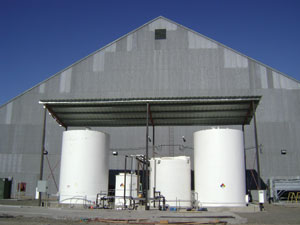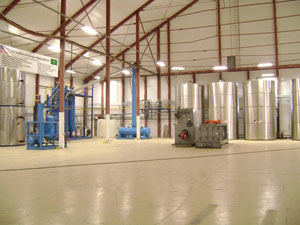Washington B2 mandate in effect; Oregon soon to follow



January 15, 2009
BY Bryan Sims
Bipartisan cooperation for a major statewide energy policy can be hard to come by, but Northwestern states have made it happen.
On Nov. 30, Washington implemented a B2 requirement that was enacted in March 2006 when Gov. Christine Gregoire signed into law Senate Bill 6508. Specifically, the legislation mandates fuel retailers to sell a B2 blend within state borders. The requirement will increase to 5 percent once in-state biodiesel production reaches 3 percent of total in-state diesel demand.
The Washington State Department of Agriculture is developing rules to implement the standard, which was endorsed by the state's Apollo Alliance, Labor Council, Farm Bureau and environmental community. In addition, all state agencies will be required to use a minimum of B20 in all diesel-powered vehicles, vessels and construction equipment by June 1.
The standard contains a contentious caveat, however, according to some existing and future biodiesel producers. "It's not an enforced mandate," said Doug Bartlett, chief executive officer of Spokane County Biodiesel, a 1 MMgy plant under construction in Spokane Valley, Wash. "It's not like you have to do this or else." The company, which temporarily suspended construction in late December due to limited funding, plans to use yellow grease as its primary feedstock.
Meanwhile, Oregon is ramping up for a similar mandate that the state legislature passed in July 2007. It requires the use of B2 once in-state biodiesel production reached 5 MMgy, which recently occurred. It also allows for an increase to B5 once production reaches 15 MMgy.
SeQuential-Pacific Biodiesel LLC, Oregon's lone operating biodiesel plant in Salem, completed a major expansion from 1 MMgy to 5 MMgy at its three-year old biodiesel facility in early November. It uses waste vegetable oil as a feedstock, as well as locally grown canola oil processed at Willamette Biomass Processors Inc., an 80 million-pound-per-year oilseed crushing plant in Rickreall, Ore., 12 miles west of Salem.
Washington now houses six operating biodiesel plants with a combined production capacity of 141 MMgy, including Inland Empire Oilseeds LLC, which began production at its 8 MMgy canola-based facility in Odessa, Wash, in mid-November. By late December, it had sold 33,000 gallons of B100 and met all ASTM D 6751 specifications. The company, formed three years ago, plans to distribute its renewable fuel throughout the Pacific Northwest and export to Pacific Rim countries. King County, Wash., the largest biodiesel-consuming county in the U.S., will be the company's core trade area, according to General Manager Steve Starr.
Inland Empire Oilseeds also plans to build an adjacent oilseed crushing facility that can process approximately 35,000 tons of locally produced canola, Starr said. Expected to be operational by June 2009, it will supply up to 50 percent of the canola oil needed for biodiesel production.
To help distribute biodiesel in this emerging market, Exxon Mobil Corp. built a $3 million blending terminal on its 15-acre fuel storage site in Spokane Valley, Wash. The facility, which opened Dec. 1, one day after the statewide B2 mandate went into effect, is Exxon Mobil's first in the U.S. The oil major said it will use a ratio blending process at the terminal's loading rack to ensure that an appropriate percentage of biodiesel is transported by truck to local service stations. Chevron Corp. has also announced plans to distribute B5 in Washington. Meanwhile, Kinder Morgan Energy Partners LP is evaluating the transportation of biodiesel in its 110-mile pipeline between Portland and Eugene, Ore.
On Nov. 30, Washington implemented a B2 requirement that was enacted in March 2006 when Gov. Christine Gregoire signed into law Senate Bill 6508. Specifically, the legislation mandates fuel retailers to sell a B2 blend within state borders. The requirement will increase to 5 percent once in-state biodiesel production reaches 3 percent of total in-state diesel demand.
The Washington State Department of Agriculture is developing rules to implement the standard, which was endorsed by the state's Apollo Alliance, Labor Council, Farm Bureau and environmental community. In addition, all state agencies will be required to use a minimum of B20 in all diesel-powered vehicles, vessels and construction equipment by June 1.
The standard contains a contentious caveat, however, according to some existing and future biodiesel producers. "It's not an enforced mandate," said Doug Bartlett, chief executive officer of Spokane County Biodiesel, a 1 MMgy plant under construction in Spokane Valley, Wash. "It's not like you have to do this or else." The company, which temporarily suspended construction in late December due to limited funding, plans to use yellow grease as its primary feedstock.
Meanwhile, Oregon is ramping up for a similar mandate that the state legislature passed in July 2007. It requires the use of B2 once in-state biodiesel production reached 5 MMgy, which recently occurred. It also allows for an increase to B5 once production reaches 15 MMgy.
SeQuential-Pacific Biodiesel LLC, Oregon's lone operating biodiesel plant in Salem, completed a major expansion from 1 MMgy to 5 MMgy at its three-year old biodiesel facility in early November. It uses waste vegetable oil as a feedstock, as well as locally grown canola oil processed at Willamette Biomass Processors Inc., an 80 million-pound-per-year oilseed crushing plant in Rickreall, Ore., 12 miles west of Salem.
Washington now houses six operating biodiesel plants with a combined production capacity of 141 MMgy, including Inland Empire Oilseeds LLC, which began production at its 8 MMgy canola-based facility in Odessa, Wash, in mid-November. By late December, it had sold 33,000 gallons of B100 and met all ASTM D 6751 specifications. The company, formed three years ago, plans to distribute its renewable fuel throughout the Pacific Northwest and export to Pacific Rim countries. King County, Wash., the largest biodiesel-consuming county in the U.S., will be the company's core trade area, according to General Manager Steve Starr.
Inland Empire Oilseeds also plans to build an adjacent oilseed crushing facility that can process approximately 35,000 tons of locally produced canola, Starr said. Expected to be operational by June 2009, it will supply up to 50 percent of the canola oil needed for biodiesel production.
To help distribute biodiesel in this emerging market, Exxon Mobil Corp. built a $3 million blending terminal on its 15-acre fuel storage site in Spokane Valley, Wash. The facility, which opened Dec. 1, one day after the statewide B2 mandate went into effect, is Exxon Mobil's first in the U.S. The oil major said it will use a ratio blending process at the terminal's loading rack to ensure that an appropriate percentage of biodiesel is transported by truck to local service stations. Chevron Corp. has also announced plans to distribute B5 in Washington. Meanwhile, Kinder Morgan Energy Partners LP is evaluating the transportation of biodiesel in its 110-mile pipeline between Portland and Eugene, Ore.
Advertisement
Advertisement
Upcoming Events





